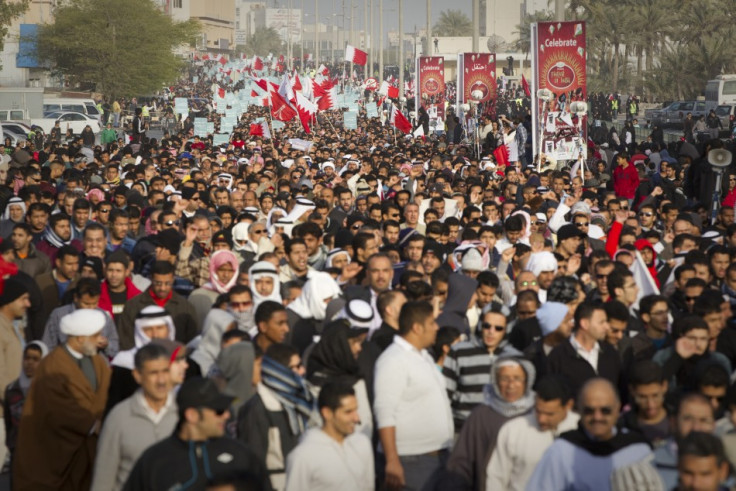Bahrain Uncovered: Regime Importing Sunni Muslims

Almost a year after pro-reform protests started in Bahrain it is still facing demonstrations and public discontent.
The tiny island kingdom 30 miles off the coast of Saudi Arabia in the Persian Gulf has a history of relatively small uprisings and the Arab Spring in Egypt and Tunisia brought activists back to the forefront of the political scene.
One of the main problems however remains the country's division along sectarian lines.
With a Sunni monarchy, relying on a largely Sunni power base, the majority Shia population has for years been disfranchised and left on the margin of the country's political life.
The government has mainly depicted the protests as Shia-led and based on sectarian demands. While opposition groups and activists have repeatedly insisted their main aim is to press for political reforms, the regime has been accused of relying on the divide and rule strategy to keep its power base loyal while ostracising the rest of the population, 70 percent of which is Shia.
In an effort to get beneath the issues, IBTimes UK meets Ali Alaswad, a member of the al-Wefaq opposition and former Bahraini MP Ali Alaswad, to discuss the situation in depth.
The Shia/Sunni Divide: State-led Discrimination?
According to the World Bank, in 2010 Bahrain had a population of 1,261,835. Just under half of the kingdom's population are Bahraini nationals and the rest are foreigners. In the last 10 years the country has seen a rapid population growth and almost doubled in size from 650,000.
Given the island's limited space and natural resources, that increase has put a huge strain on the native population and its workforce.
While historically the Bahraini Shia population has been the most active in pressing for political reforms, sectarian tensions have been increased following the regime's slow pace at implementing promised political reforms.
One of the main accusations laid against the regime is the institutionalisation of discrimination.
Unbalanced Representation
One of the most tangible examples is the gerrymandering of parliamentary electoral districts to secure Sunni representation over the Shia majority.
"One of the main demands of the protesters is to have a fairer and more balanced district representation," Ali Alaswad said.
The Bahraini National Assembly is made up of the Council of Representatives of 40 elected members and of the Consultative Council, which has 40 members who are royally appointed.
As a result of the disproportionate district representation, the 2010 elections saw 22 Sunni parliamentarians elected against 18 Shia.
Political Naturalisation:
The government has also been accused of actively pursuing policies to change the country's demographic balance by granting citizenship to non-Bahrainis - mainly Sunnis originating from Syria, Yemen and Jordan - to reduce the size of the Shia majority.
"It seems that the regime is using foreign nationals to consolidate its power base. By providing them with better living conditions than in their home country it on the other hand expects them to remain loyal," said Alaswad.
The regime has also naturalised many migrant workers from Asia and South Asia, leading to further tensions. With an official unemployment level at 16.5 percent and an unofficial level closer to 30 percent, the regime's policies have increased anger and incomprehension among the public.
"One of the main problems is that with such a high level of unemployment it is difficult to understand why Bahraini nationals, whether Sunni or Shia, are not given the priority when it comes to jobs. Both Shia and Sunni are suffering from the consequences of the political naturalisation," Alaswad said.
Public Sector
Most Shia Bahraini struggle to find employment in the public sector. High-ranked positions within the state-controlled public sector are often out of reach of the Shia, with the Crisis Group, an independent, non-profit, non-governmental organisation committed to preventing and resolving deadly conflicts, noting that the Bahrain defence forces and the interior ministry are particularly affected by discrimination among Shia.
Alaswad said: "I was an engineer in the Ministry of Force. My superior once complimented me on my work, saying I was an outstanding engineer. He said he wanted to promote me but could not. I was a Shia and an active member of the opposition group al-Wefaq, and that did not fit in well with the regime.
"Even Shia who are not actively taking part in opposition groups or movements are discriminated against and that also covers the educational field. Scholarships, for example, are more easily distributed to the Sunni than the Shia," he added.
Economic Problems
The majority of the native population suffers from under-employment and low wages.
"Social justice in Bahrain is non-existent. The majority of the jobless are Shia," Aswad said.
In the absence of effective state-provided insurance and poor local health facilities, the poorest face tough living conditions. And while housing costs have increased, low wages have left many aspiring Bahrainis unable to afford decent accommodation.
With a country so deeply divided, it is no surprise that the uprising is seen through the prism of sectarianism.
© Copyright IBTimes 2024. All rights reserved.






